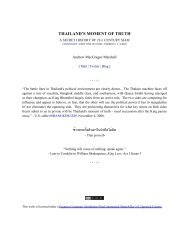THAILAND'S MOMENT OF TRUTH - ZENJOURNALIST
THAILAND'S MOMENT OF TRUTH - ZENJOURNALIST
THAILAND'S MOMENT OF TRUTH - ZENJOURNALIST
Create successful ePaper yourself
Turn your PDF publications into a flip-book with our unique Google optimized e-Paper software.
A law originally intended to shield the monarchy from insults and slander has become something far<br />
more: it is increasingly used to prevent any questioning of Thailand's established social and political<br />
order. As historian David Streckfuss says in the foremost academic work on the subject, Truth on Trial in<br />
Thailand: Defamation, Treason, and Lèse Majesté: "Never has such an archaic law held such sway over<br />
a 'modern' society (except perhaps 'Muslim' theocracies like Afghanistan under the Taliban)":<br />
Thailand's use of the lèse majesté law has become unique in the world and its elaboration and<br />
justifications have become an art. The law's defenders claim that Thailand's love and reverence<br />
for its king is incomparable. Its critics say the law has become the foremost threat to freedom<br />
of expression. Barely hidden beneath the surface of growing debate around the law and its use<br />
are the most basic issues defining the relationship between those in power and the governed:<br />
equality before the law, rights and liberties, the source of sovereign power, and even the system<br />
of government of the polity - whether Thailand is to be primarily a constitutional monarchy, a<br />
democratic system of governance with the king as head of state, or a democracy.<br />
Most Thais remain unaware of the full story of how Bhumibol restored the power and prestige of the<br />
monarchy over the past half century. Handley's book The King Never Smiles is banned in Thailand - as<br />
is Handley himself - because he violated the taboo that forbids a critical look at the role of the palace in<br />
Thailand's modern history. As he writes in the introduction:<br />
Any journalist or academic who takes an interest in Thailand soon learns that one topic is offlimits:<br />
the modern monarchy. One is told variably that there is nothing more to say than the<br />
official palace accounts; that such matters are internal; that the subject is too sensitive and<br />
complex for palace outsiders to handle; or simply that it is dangerous, and one risks expulsion or<br />
jail for lèse majesté.<br />
Most people give in to these explanations with little argument. It is easy to do: nearly every Thai<br />
one meets expresses unquestioning praise for the king, or at least equivocates to the point of<br />
suggesting that there really is not much to be said: the history that is in the open is the whole of<br />
it. Palace insiders sometimes concede that there is indeed more to the story, but then demur to say<br />
that only real insiders, only Thais within the inner royal circle, can comprehend the mysteries of<br />
the king’s reign.<br />
The subject, then, hardly seems worth the trouble to dig into, and so as even the most curious<br />
succumb to Thailand’s charm and King Bhumibol’s carefully crafted image, the palace remains<br />
an enigma. The result, however, is a crucial gap in modern Thai history and political analysis.<br />
Thongchai Winichakul, a history professor at the University of Wisconsin-Madison and visiting fellow<br />
at the National University of Singapore, discussed the chilling effect of the lèse majesté law in his 2008<br />
paper Toppling Democracy:<br />
The current generation of Thais mostly grew up after the Second World War when they no<br />
longer lived with the memories and experiences of the 1932 revolution. Instead they have lived




